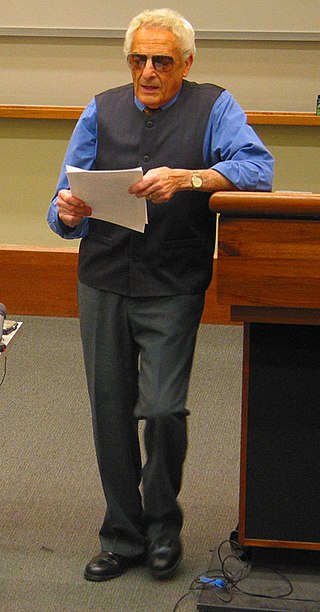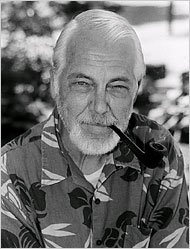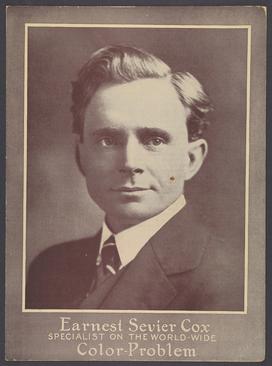Scientific racism, sometimes termed biological racism, is the pseudoscientific belief that the human species is divided into biologically distinct taxa called "races", and that empirical evidence exists to support or justify racial discrimination, racial inferiority, or racial superiority. Before the mid-20th century, scientific racism was accepted throughout the scientific community, but it is no longer considered scientific. The division of humankind into biologically separate groups, along with the assignment of particular physical and mental characteristics to these groups through constructing and applying corresponding explanatory models, is referred to as racialism, race realism, or race science by those who support these ideas. Modern scientific consensus rejects this view as being irreconcilable with modern genetic research.

Anthony James Gregor was an American political scientist and eugenicist and professor of political science at the University of California, Berkeley, known for his research on fascism, Marxism, and national security.
The Pioneer Fund is an American non-profit foundation established in 1937 "to advance the scientific study of heredity and human differences". The organization has been described as racist and white supremacist in nature. The Southern Poverty Law Center classifies the Pioneer Fund as a hate group. One of its first projects was to fund the distribution in US churches and schools of Erbkrank, a Nazi propaganda film about eugenics.

Wickliffe Preston Draper was an American political activist. He was an ardent eugenicist and lifelong advocate of strict racial segregation. In 1937, he founded the Pioneer Fund for eugenics and heredity research; he later became its principal benefactor.

Harry Hamilton Laughlin was an American educator and eugenicist. He served as the superintendent of the Eugenics Record Office from its inception in 1910 to its closure in 1939, and was among the most active individuals influencing American eugenics policy, especially compulsory sterilization legislation.
Nordicism is an ideology which views the historical race concept of the "Nordic race" as an endangered and superior racial group. Some notable and influential Nordicist works include Madison Grant's book The Passing of the Great Race (1916); Arthur de Gobineau's An Essay on the Inequality of the Human Races (1853); the various writings of Lothrop Stoddard; Houston Stewart Chamberlain's The Foundations of the Nineteenth Century (1899); and, to a lesser extent, William Z. Ripley’s The Races of Europe (1899). The ideology became popular in the late-19th and 20th centuries in Germanic-speaking Europe, Northwestern Europe, Central Europe, and Northern Europe, as well as in North America and Australia.

Mankind Quarterly is a pseudoscientific journal that covers physical and cultural anthropology, including human evolution, intelligence, ethnography, linguistics, mythology, archaeology, and biology. It has been described as a "cornerstone of the scientific racism establishment", a "white supremacist journal", and "a pseudo-scholarly outlet for promoting racial inequality". The Mankind Quarterly is published by the white nationalist Human Diversity Foundation.
Audrey Mary Shuey (1900–1977) was an American psychologist and writer. She served as the Chair of the Department of Psychology at Randolph-Macon Women's College.

Linda Susanne Gottfredson is an American psychologist and writer. She is professor emerita of educational psychology at the University of Delaware and co-director of the Delaware-Johns Hopkins Project for the Study of Intelligence and Society. She is best known for writing the 1994 letter "Mainstream Science on Intelligence", which was published in the Wall Street Journal in defense of Richard Herrnstein and Charles Murray's controversial book The Bell Curve (1994).
The Institute for the Study of Academic Racism (ISAR) is an organization that monitors "changing intellectual trends in academic racism, biological determinism, and eugenics." ISAR states that in this capacity it "acts as a resource service for students, academics, journalists, legislators and civil rights activists." ISAR was founded by Barry Mehler in 1993.
Glayde D. Whitney was an American behavioral geneticist and psychologist. He was professor at Florida State University. Beyond his work into the genetics of sensory system function in mice, in his later life he supported David Duke as well as research into race and intelligence and eugenics.

Roger Pearson is a British anthropologist, eugenicist, white supremacist, political organiser for the extreme right, and publisher of political and academic journals.
Henry Edward Garrett was an American psychologist and segregationist. Garrett was President of the American Psychological Association in 1946 and Chair of Psychology at Columbia University from 1941 to 1955. After he left Columbia, he was visiting professor at the University of Virginia. A.S. Winston chronicles that he was involved in the International Association for the Advancement of Ethnology and Eugenics (IAAEE), the journal Mankind Quarterly, the neofascist Northern League, and the ultra-right wing political group, the Liberty Lobby.

David Thoreson Lykken was a behavioral geneticist and Professor Emeritus of Psychology and Psychiatry at the University of Minnesota. He is best known for his work on twin studies and lie detection.

Carleton Putnam was an American businessman, writer and advocate for racial segregation. He graduated from Princeton University in 1924 and received a Bachelor of Laws (LL.B.) from Columbia Law School in 1932. He founded Chicago & Southern Airlines in 1933 which, in 1953, merged with Delta Air Lines. Putnam later served as chief executive officer of Delta Air Lines and held a seat on its board of directors until his death.
Robert E. Kuttner was an American biologist and white supremacist.
Donald A. Swan was an American anthropologist and advocate for eugenics and segregation.

Earnest Sevier Cox was an American Methodist preacher, political activist and white supremacist. He is best known for his political campaigning for stricter segregation between blacks and whites in the United States through tougher anti-miscegenation laws, for his advocacy for "repatriation" of African Americans to Africa, and for his book White America. He is also noted for having mediated collaboration between white southern segregationists and African American separatist organizations such as UNIA and the Peace Movement of Ethiopia to advocate for repatriation legislation, and for having been a personal friend of black racial separatist Marcus Garvey.

Gerhard Meisenberg is a German biochemist. As of 2018, he was a professor of physiology and biochemistry at Ross University School of Medicine in Dominica. He is a director, with Richard Lynn, of the Pioneer Fund, which has been described as a hate group by the Southern Poverty Law Center. He was, until 2018 or 2019, the editor-in-chief of Mankind Quarterly, which is commonly described as a white supremacist journal and purveyor of scientific racism.
Neue Anthropologie was a quarterly anthropology journal. It was published in Hamburg, West Germany by the Society for Biological Anthropology, Eugenics and Behavioural Science, whose chairman, Jürgen Rieger, was also the journal's editor. It served as a platform for neo-Nazi psychological and anthropological pseudoscience, with a particular focus on scientific racism.









